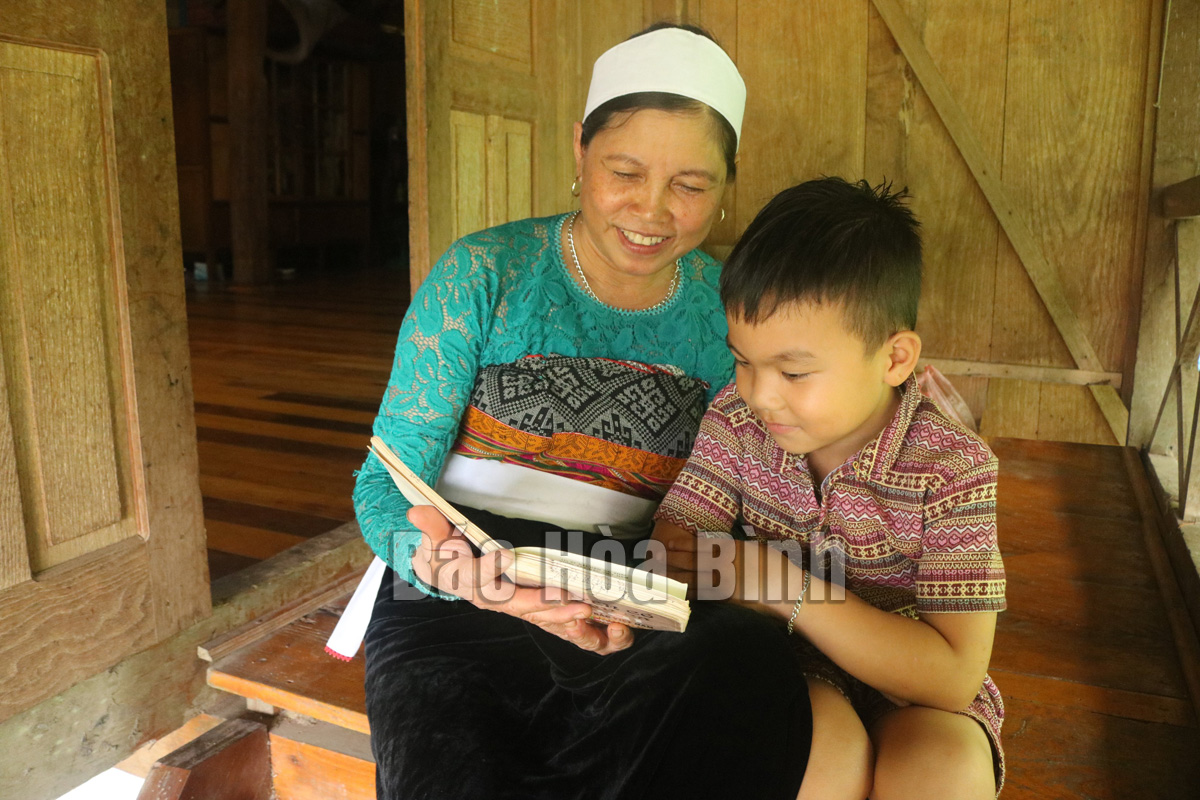
(HBO) – With their strong enthusiasm and passion, Hoa Binh folk singers have worked hard to preserve and promote the value of folk melodies and popularise it in the contemporary life with a hope that the national cultural tradition will live forever.
Artisan Ha Thi Bich in Xam Pa hamlet, Na Phon commune of Mai Chau district,
teaching her grandson to sing folk songs.
Bach Thi Dao, a veteran artisan in Beo hamlet,
Xuan Thuy commune of Kim Boi district, inherited the love for Muong folk
singing from her parents. She has used melodies for communications work.
Meanwhile, Quach Thi Lon from Khanh hamlet of An
Nghia commune represents the young generation of Muong folk singers. She is one
of the youngest Muong folk singers and performers of Lac Son district.
Prompted by the desire to preserve and
popularise the beauty of Muong folk songs to people of other ethnic groups
throughout the country, she and Emeritus Artisan Bui Huy Vong have worked with
each other to develop a YouTube channel called Quach Lon. by now, the channel
has been operating for more than two years, attracting over 14,000 subscribers,
with 1,100 videos of Muong folk songs performed by her that draw a great number
of views.
With more than 50 years of popularising folk
songs to younger generations, artisan Ha Thi Bac is considered a "living
archives" of Thai folk songs as she can sing hundreds of songs as well as
deeply understand the meaning of the lyrics.
In 1998, Bich released an album containing 15
Thai folk songs that she loved most. Operating for more than three years, the
Thai folk song club in Xam Pa hamlet, established by artisan Ha Thi Bich, has
attracted nearly 20 members who are children, teenagers and women who gather
two or three times each month.
Along with regular singing, performing and
exchanging activities and maintaining the club's operations, she has also taught
Thai folk songs to the younger generations with a hope of preventing the risk
of the disappearance of the national cultural identity.
Ha Yen Nhi, a young member of the club for over
one year, said that so far she has learnt to sing 15 Thai folk songs. With the
support of Bich, Nhi’s love and passion for the melodies have been nurtured and
developed, along with her sense of responsibility to maintain and develop Thai
folk songs.
Dao, Lon and Bich are three among the many
artisans who are exerting efforts to maintain the traditional culture and
transfer it to the youth./.
Phong Phu commune, Tan Lac district of Hoa Binh province, is widely regarded as the cultural heartland of the Muong ethnic group. Among its many traditional communities, Luy Ai hamlet (formerly Ai hamlet) stands out as a rare location where the customs and way of life of the Muong Bi people remain largely intact.
The Truong Kha temple festival, a distinctive cultural event held every three years in Vu Ban township, Lac Son district, returned recently with vibrant rituals and folk traditions of the Muong people. Located next to the Buoi River in the Muong Trao fields, the Truong Kha Temple is dedicated to the three Kun Dol deities, revered for teaching farming techniques, irrigation, weaving, and protecting the harvest.
The demand for spaces serving community activities of residents in various areas across Hoa Binh city has been satisfied as local cultural houses now feature modern, spacious facilities thanks to the effective implementation of Resolution No. 49/NQ-HDND issued on December 28, 2021 by the city People's Council, which approved the plan for reorganising, converting, and allocating land for the construction, repair, and expansion of cultural houses in Hoa Binh’s villages and residential areas until 2025.
At the end of May, the Hoa Binh Provincial Ethnic Arts Troupe organized a series of performances for residents in Region 2 and Region 3 communes across the province. Bringing art to ethnic communities in remote, isolated, and especially disadvantaged areas has become a meaningful activity. These are not merely artistic performances but also journeys to disseminate cultural values, enrich spiritual life, and contribute to preserving the cultural identity of ethnic minorities.



